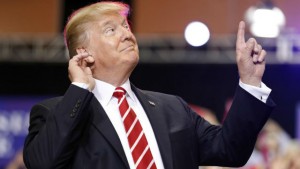Home » Commentary » Opinion » Trump and the Pax Americana
· Ideas@TheCentre

 After July’s G20 summit in Hamburg, the ABC’s Chris Uhlmann remarked that President Trump cast an “uneasy, lonely, awkward figure” who had “pressed fast forward on the decline of the United States as the global leader.” The television clip went viral online. But was Uhlmann right?
After July’s G20 summit in Hamburg, the ABC’s Chris Uhlmann remarked that President Trump cast an “uneasy, lonely, awkward figure” who had “pressed fast forward on the decline of the United States as the global leader.” The television clip went viral online. But was Uhlmann right?
It is certainly true Donald Trump has unnerved many people around the world. His strident ‘America First’ campaign rhetoric, taken together with his decisions to withdraw the U.S. from both the Trans-Pacific Partnership and the Paris climate accords, raised doubts about the Pax Americana. The U.S. is also bogged down in a crisis of confidence, exacerbated by its toxic polarisation and hyper-partisan political culture.
But it is also true Trump has reaffirmed the security alliances with Japan, South Korea and Australia in Asia, Israel and the Saudi-led Sunni Gulf states in the Middle East and — albeit grudgingly — NATO in Europe. So much for withdrawing the U.S. from the world. Nor has he imposed the 45% tariffs on China or 30% tariffs on Mexico that would have pushed the global economy into recession.
Although the U.S. will not command the kind of strategic and economic pre-eminence it has held since the 1940s — a trend Richard Nixon recognised as early as the early 1970s — America will remain the most powerful state in the world for the foreseeable future.
America has the largest and the most technologically superior military in the world. It has the most diverse and technologically advanced economy. Global tech platforms, such as Google, Microsoft and Facebook, are used by more than a billion people. All dominate their respective markets; all are American.
America is demographically vibrant: its fertility rates surpass those of its competitors Japan, Europe and China. It has transformed itself into an energy superpower: the shale gas ‘fracking’ revolution means energy self-sufficiency and independence.
To be sure, a clash is taking place between Trump (who is apparently attacking the liberal international order) and U.S. foreign-policy elites (who champion American global leadership). In the meantime, as the University of Chicago’s John Mearsheimer has argued, this produces an American foreign policy that is discombobulated and hard to understand. That unnerves allies.
If the U.S. is committed to keeping in check a rising China — the only true rising hegemon capable of destabilising regional order and American primacy — it needs a president who is thinking strategically and working closely with regional allies. But that is not happening, because Trump is widely perceived as a loose cannon and strikingly ignorant of the world — a potentially deadly combination.
Trump and the Pax Americana